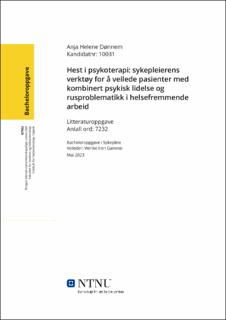| dc.contributor.advisor | Gamme, Wenke Iren | |
| dc.contributor.author | Dønnem, Anja Helene | |
| dc.date.accessioned | 2023-07-25T17:19:33Z | |
| dc.date.available | 2023-07-25T17:19:33Z | |
| dc.date.issued | 2023 | |
| dc.identifier | no.ntnu:inspera:139585348:151284293 | |
| dc.identifier.uri | https://hdl.handle.net/11250/3081335 | |
| dc.description.abstract | Hesteterapi er en innovativ behandlingsmetode som anvender hester som et terapeutisk hjelpemiddel. Denne litteraturstudien utforsker hvordan sykepleiere kan anvende hester i psykoterapeutisk behandling av pasienter med kombinert psykisk lidelse og rusproblematikk som bidrag til langvarig helsefremming. Denne pasientgruppen har fått mer oppmerksomhet i senere tid på grunn av lidelsens kompleksitet, høy forekomst av frafall i behandling, og behov for nye behandlingstiltak. For å identifisere relevant forskningslitteratur ble det gjort et strukturert søk i databasene Pubmed og CINAHL, og “snøball-teknikk” ble anvendt for å finne ytterligere artikler. Aveyards tematiske analysemodell ble brukt for å tematisere funnene i 3 hovedkategorier: 1. identitet, emosjonell påvirkning, og mestringsfølelse; 2. sosial kompetanse og relasjon til behandler; og 3. fullføring av behandling og motivasjon. Litteraturstudiet viste at hesteterapi kan: styrke pasientenes følelse av identitet, fungere som en emosjonell støtte under behandling, bidra til mestringsfølelse, gi en følelse av tilhørighet i et sosialt miljø, styrke deres relasjon til sykepleieren, være en motiverende faktor under behandlingen, samt bidra til økt sjanse for å fullføre behandlingen. Til tross for lovende resultat, kreves mer forskning med bredere metodisk tilnærming til for å verifisere funnene.
Nøkkelord: Rus, psykisk lidelse, hesteterapi, helsefremming, sykepleier | |
| dc.description.abstract | Equine-assisted therapy is an innovative treatment method that utilizes horses as a therapeutic aid. This literature study explores how nurses can use horses in psychotherapeutic treatment of patients with combined mental illness and substance use disorder to facilitate long lasting health promotion. This patient group has received more attention recently because of its complexity, high dropout rates, and need for alternative treatments. To identify relevant research literature, a structured search in Pubmed and CINAHL, and “snowballing” was used to find additional articles. Aveyards thematic model for analysis was used to thematize findings into 3 main categories: 1. identity, emotional impact, and sense of mastery; 2. social competence and relation to therapist; and 3. completion of treatment and motivation. Equine-assisted therapy in treatment of patients with combined mental illness and substance use disorder has been found to: strengthen the patients sense of identity, work as an emotional support during treatment, promote a sense of mastery, contribute to a sense of connection in a social environment, strengthen the patient's relation to the nurse, be a motivational factor during treatment, and contribute to higher treatment completion rates. Despite promising results, further research including a broader methodological approach is needed to verify the findings.
Key words: Substance use disorder, mental illness, equine-assisted therapy, health promotion, nurse | |
| dc.language | nob | |
| dc.publisher | NTNU | |
| dc.title | Hest i psykoterapi: sykepleierens verktøy for å veilede pasienter med kombinert psykisk lidelse og rusproblematikk i helsefremmende arbeid | |
| dc.type | Bachelor thesis | |
